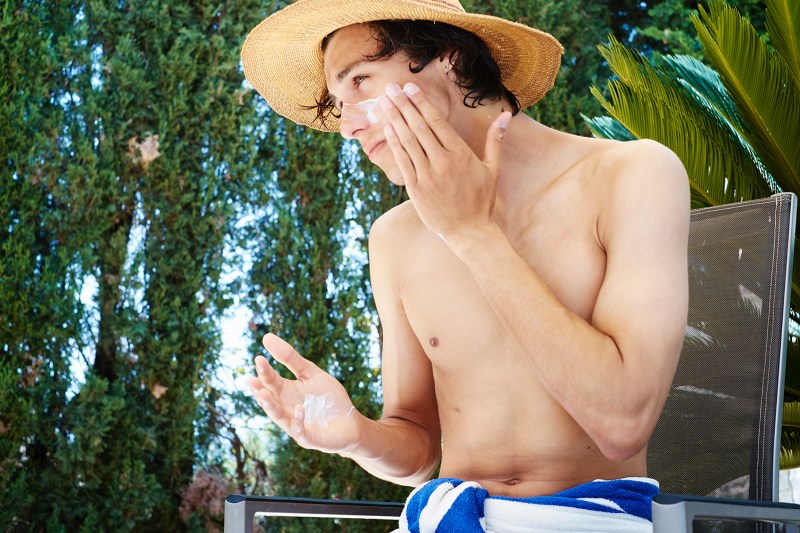
With summer just around the corner, it’s about time to bust out the shorts, flip-flops, and not-so-ironic Hawaiian shirts that have been gathering dust all year. As you dig for the swim trunks stuffed in the back of your dresser drawer, you can’t forget about another summer style essential: sunscreen.
Sunscreen is a must-have not just on boats, beaches, and boardwalks, but also every day. Dermatologists recommend using an SPF of 30 or higher every day of the year, but especially during the summer when the sun’s rays are at their most powerful.
Although the experts recommend wearing SPF daily, the safety of chemical sunscreen has recently come into question after a 2020 study from the FDA showed that ingredients commonly found in most chemical sunscreens—oxybenzone, octinoxate, octisalate, octocrylene, homosalate and avobenzone—were found to be absorbed into the bloodstream after a single application.
Related Guides
While it’s not surprising that something that you put on your skin is absorbed into the body (your pores are, after all, holes), the findings from this study aren’t alarming enough to warrant throwing out all the sunscreens you own, but they are important to understand in a larger context around sunscreen safety.
With all the confusing ingredient names and SPF protection levels, understanding the complicated world of sunscreen safety is no easy feat. To help you make the most informed decision on which sunscreen is right for you, we spoke to dermatologist Dr. Corey L. Hartman to debunk chemical sunscreen myths and answer all your most pressing sunscreen questions.
Chemical vs. Physical Sunscreen
Not all sunscreen is created equal. There are two types of sunscreen: chemical and physical. What determines if a sunscreen chemical or physical is the ingredients, which determine how the sunscreen blocks the ultraviolet rays of the sun.
“Chemical sunscreen absorbs into the skin and then absorbs UV rays, converts the rays into heat, and releases them from the body,” says Dr. Hartman. “Physical sunscreen sits on top of the skin and reflects the sun rays.”
The active ingredients in chemical sunscreens include avobenzone, octanoate, and oxybenzone. The minerals titanium dioxide and zinc oxide are the two ingredients in physical sunscreen, which is also commonly referred to as mineral sunscreen.
Physical sunscreen is to blame for the horrible white or purple/gray cast you might spot at the beach. The mineral ingredients in physical sunscreen create a physical barrier between your skin and the sun’s rays.
“Traditionally, mineral sunscreens have not been as elegant as chemical sunscreens, especially for people with brown and black skin,” says Dr. Hartman. “Breakthrough products that provide physical SPF protection for darker skin types without leaving a white or iridescent cast are innovations indeed.”
Is Chemical Sunscreen Safe?
A scientist will be the first to tell you that not all chemicals are bad. Water is a chemical, and it’s something our body depends on for survival. Similarly, not all chemical sunscreen is bad. Dr. Hartman assures us that chemical sunscreen is safe, but if you’re sensitive to any of the ingredients commonly found in chemical sunscreen, physical sunscreen might be the best option for you.
“The data has established that the chemicals are absorbed into the bloodstream, but in small amounts,” he says. “The effect of this absorption has not been determined, however. So while the current research supports the safe use of chemical sunscreen, a completely physical option is definitely the safest option.”
Best Chemical and Physical Sunscreens
Oars + Alps Everyday Anti-Aging Face Moisturizer with SPF 37

This hybrid sunscreen is the best of both worlds. It combines the power of both chemical and physical sunscreen, and as a bonus, it’s reef and environment-friendly. Definitely pack this one on your next trip to Hawaii.
La Roche-Posay Anthelios Mineral Zinc Oxide Sunscreen SPF 50

Safe for sensitive skin, this mineral sunscreen goes on light and absorbs into the skin quickly. This is one of the rare mineral sunscreens that we’ve found that doesn’t leave a white cast due to its ultra-thin consistency, but rest assured you are protected from the sun’s UVA/UVB rays.
Neutrogena Hydro Boost Water Gel Lotion Sunscreen SPF 50

If you hate the feeling of rubbing in stubborn, streaky sunscreen, look no further than this water gel lotion from Neutragena. The hydrating formula goes on smooth while hydrating dry, sun-baked skin. Made with avobenzone, homosalate, octisalate, and octocrylene, this chemical formula feels elegant, making it incredibly easy to reapply.
Supergoop! PLAY Everyday Lotion SPF 50 PA++++

This ultra-moisturizing formula is designed to be fast-absorbing, non-greasy, water- and sweat-resistant, as well as reef-safe. You can run, jump, and yes, play in this sunscreen knowing you’re protected from photoaging and dehydration. Safe for sensitive skin, this chemical sunscreen won’t cause breakouts.
CeraVe Sunscreen Stick SPF 50

If you’re going on a long run or bike ride, you can’t forget to reapply sunscreen. This compact mineral stick makes it really easy to carry in your pocket or a bag and swipe on more protection whenever you need it. The mineral sunscreen glides on smooth and dries clear to prevent those powerful UVA and UVB rays from penetrating your skin. Perfect for on-the-go, this stick is a real skin-saver.



